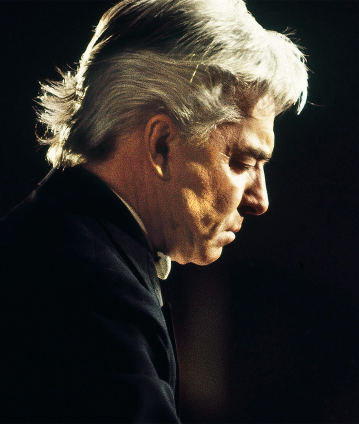Karajan conducts Brahms’s Symphonies Nos. 1–4

Johannes Brahms’s symphonies were among the cornerstones of Herbert von Karajan’s repertoire – and his compositions have also played a more important role in the work of the Berliner Philharmoniker than almost any other composer’s. So when it came to this music, the partnership between orchestra and conductor was a particularly happy one, as these 1973 recordings of all four Brahms symphonies show: performances full of passion and dark fire.
The Berliner Philharmoniker’s Brahms tradition goes back to the orchestra’s earliest years when in 1887 Brahms’s friend and musical ally Hans von Bülow became its artistic director. As Herbert von Karajan was fond of pointing out, Brahms and Bülow did not always see eye to eye about the interpretation of Brahms’s music. Bülow was a stickler for strict tempi; Brahms was more given to what he himself called “slowings and accelerations”. Two inspirational conductors followed Bülow in Berlin, Arthur Nikisch (1895–1922) and Wilhelm Furtwängler (1922–54), a noted Brahmsian much given to “slowings and accelerations”. It was a style of playing – rooted in a rich, rounded orchestral sound and a willingness to move freely between tempi within a single commanding pulse – which Karajan inherited and made his own.
The First Symphony, over which Brahms laboured so long, is an openly passionate work. It is also the symphony which Karajan conducted more than any other. In his early years he used it as a musical calling-card at important debut concerts in Aachen (1934), Amsterdam (1938) and Vienna (1946). It was also the work with which he concluded the opening concert of his own and the Berliner Philharmoniker’s first ever North American tour in Washington in February 1955.
Away from complete cycles, Karajan conducted the Third Symphony relatively infrequently. This was not the case, however, where the lyrical Second and the fateful Fourth were concerned. Karajan loved both works and rarely conducted a less than memorable performance of either. At his debut with the Berliner Philharmoniker on 8 April 1938, the programme concluded with the Fourth. Writing in the Berliner Tageblatt, the distinguished critic Heinrich Strobel praised the performance for its “rhythmic inexorability”, its “incredible musical energy” and the “intensity of its melodic shaping”.
© 1973 Unitel
Artistes
Nos suggestions
- Karajan conducts Beethoven’s Symphonies Nos. 1 & 4
- Karajan conducts Beethoven’s Sixth Symphony
- Karajan conducts Beethoven’s “Missa solemnis” in Salzburg
- Karajan conducts Brahms’s “German Requiem” in Salzburg
- Karajan conducts Tchaikovsky’s Symphonies Nos. 4–6
- Karajan and Weissenberg perform Tchaikovsky and Rachmaninov